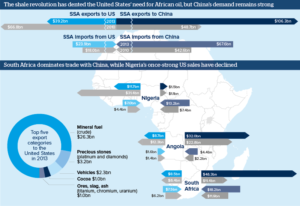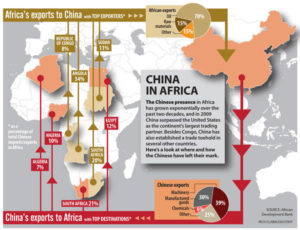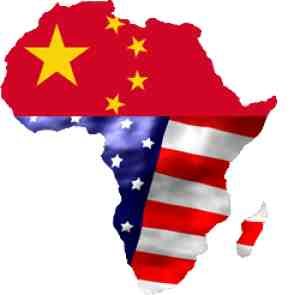China in Africa: Where is America?
In 2009, China surpassed the US as Africa’s largest trading partner and with USD 14.1 billion of Chinese FDI in Africa as late as 2011, China has positioned its interest in Africa ahead of America and other developed countries. During Chinese Premier Li Keqiang visit to the African Union in 2014, he announced that China expects to achieve USD 400 billion in trade volumes with Africa and aims to raise its direct investment in the continent to USD 100 billion by 2020. Evidently China’s total trade with Africa grew from USD 6.3 billion in 1999 to USD166 billion in 2011, and continues to increase, even if some may state that it is exploitative and detrimental to Africa.

China’s relationship with Africa dates as far back as 202 BC, AD 220 and even until 15th century and as recently as 1978, and this impactful engagement has been assessed by many including Howard French and David Shinn, in addition to the watchers such as China-Africa Project and Sino-Africa network; all with the aim to evaluate the shoddier relations between the African continent and the World. Even though numerous experts have articulated China’s role in Africa, very few have assessed America role in Africa in convergence with stakeholder’s engagement for global positioning. The two polarizing powers are China, a country that has long been enigmatic to the West, and America, a country that has been seen by the world as an exemplary country for producing great people as emphasized by author and historian Aaron Miller and been known as a “land of opportunity for all” by all.
China in Africa
1/3 of China’s oil imports, 90% of China’s cobalt, 35% of China’s manganese, 30% of China’s tantalum comes from African countries, which reinforces the African countries 65% of mineral fuel and lubricants export to China. Inversely, China’s exports count 48% in machineries and transport equipments aside from a 31% in manufactured intermediary goods. The 2000 Chinese companies underpins China’s interest in the region, and as new ones continue to flock in various parts of Africa in addition to the estimated 1 million Chinese nationals working or living on the African continent, it puts the urgency on American investors and companies who remain in dismay as some have reported that 84% of US institutional investors with an accumulated USD 1 trillion dollars in assets under management have little or no knowledge of investment opportunities in Africa. The most that is known about Africa is South Africa due to its population diversity and through the African-American constituency’s engagement during the apartheid movement back in 1990’s. Unknowingly for some, a country like Egypt that is part of Africa is considered as a historical country included as part of human civilization and mentioned in educational materials. Nigeria is another country that has surged in the mainstream with the stereotypical narrative of barbarism through the acts of Boko Haram, and throughout the years, very few might have heard of Ethiopia, Ghana, Morocco, Senegal, Sudan, and Zimbabwe.
investors with an accumulated USD 1 trillion dollars in assets under management have little or no knowledge of investment opportunities in Africa. The most that is known about Africa is South Africa due to its population diversity and through the African-American constituency’s engagement during the apartheid movement back in 1990’s. Unknowingly for some, a country like Egypt that is part of Africa is considered as a historical country included as part of human civilization and mentioned in educational materials. Nigeria is another country that has surged in the mainstream with the stereotypical narrative of barbarism through the acts of Boko Haram, and throughout the years, very few might have heard of Ethiopia, Ghana, Morocco, Senegal, Sudan, and Zimbabwe.
America in Africa
Sadly, few in America advocate for stronger relations with Africa and despite its historical ties, America has maintained a transactional relation rather than solidifying the relations through cultural acceptance and mutual economic benefits. This lack of reciprocal involvement is demonstrated with only 1 percent of U.S. foreign direct investment in Africa with half in the extractive industries, whereas the aid arm of America- USAID- has played a critical role by injecting billions since its inception, and has been providing resources for trade capacity building, including a $200 million African Global Competitiveness Initiative from 2006-2011. U.S. exports to Africa were just over $22 billion in 2012, or about 2 percent of U.S. exports worldwide, and U.S. goods and services exports to Africa reached a record high of USD 50.2 billion in 2013, up 40 percent since 2009- supporting 250,000 U.S. jobs. America despite its good-will for Africa has been indecisive about its approach. For instance, in 1995, at the outset of the 104th Congress, substantial reductions in aid to Africa had been anticipated, as many questioned the importance of Africa to U.S. national security interests in the post-cold war era. Here we are 20 years later, America is still determining its strategy to engage in Africa.
With a couple of legislations such as Africa Growth Opportunity Act (AGOA) passed in 2000 during Pres. Clinton presidency and extended in 2015 until 2025 during Pres. Obama executive leadership; America lack of cross-cultural communication, with its repetitive interference in domestic policies in African countries, has limited its rebranding in Africa- even if there are some favorable indicators such as Power Africa, Trade Africa, and Washington Mandela Youth Fellows (YALI). Although Pres. Clinton and Pres. Obama are the only two presidents to have extended their governance to Africa and the African Diaspora constituents, Pres. Bush Jr. has also left his footprint in Africa by visiting African countries such as Ghana and implementing programs such as PEPFAR. Hence, in 2015, President Obama becomes the first seating US president who has traveled multiple times to Africa, hosted the presence of African leaders in Washington DC and to have addressed country leaders at the African Union; a gesture of good-will and friendship especially as he is adored and embraced as the first African American President of the New World.
China vs America
 While Americans are tantalized by Caitlyn and Cecil the Lion, China the vigilant tiger, un-preoccupied by Africa’s stories of risky outcomes & the untrustworthiness of Africans, has brilliantly tended to African leadership while unapologetically acquiring Africa’s land and securing China’s conquest. China has defined Africa narrative as a land of opportunity and platforms like CCTV capture Africa’s beauty and abundant opportunities for economic engagement. Contrarily to China, America- even with Google- if one Google’s Africa + Economic + Growth, the abundance yet insufficient amount of information is available about African countries development and opportunities, notwithstanding the 400 billion dollars worth of resources that leaves the continent of Africa every year. It is presumed that many Americans believe that religion and political reasons are the motive for chaos in Africa, and even in the case of Nigeria despite the terrorism rhetoric; its GDP grew five folds between 2000-2011 aside from experiencing its first democratic election and transition in 2015. With President Obama visit to Ethiopia and Kenya, however controversial it may have been, many have reported the nervousness of the Chinese government as each superpower is working to expand its empire, thus the competitiveness for Africa’s riches.
While Americans are tantalized by Caitlyn and Cecil the Lion, China the vigilant tiger, un-preoccupied by Africa’s stories of risky outcomes & the untrustworthiness of Africans, has brilliantly tended to African leadership while unapologetically acquiring Africa’s land and securing China’s conquest. China has defined Africa narrative as a land of opportunity and platforms like CCTV capture Africa’s beauty and abundant opportunities for economic engagement. Contrarily to China, America- even with Google- if one Google’s Africa + Economic + Growth, the abundance yet insufficient amount of information is available about African countries development and opportunities, notwithstanding the 400 billion dollars worth of resources that leaves the continent of Africa every year. It is presumed that many Americans believe that religion and political reasons are the motive for chaos in Africa, and even in the case of Nigeria despite the terrorism rhetoric; its GDP grew five folds between 2000-2011 aside from experiencing its first democratic election and transition in 2015. With President Obama visit to Ethiopia and Kenya, however controversial it may have been, many have reported the nervousness of the Chinese government as each superpower is working to expand its empire, thus the competitiveness for Africa’s riches.
At this stage, America seems to have finally understood the importance of Africa, especially for its own growth and prosperity. Pres. Obama visit to Africa had been architected to shift the attention of American constituents towards Africa as a means to economically benefit America, however the same disconcerting stories of Africa continues to numb Americans while the bewildering current state of America has skewed America’s Brand.
Nowadays, America seems to no longer know what America is and is becoming, and perhaps the book “Adios to America”- written by Ann Cloutier resonates in these times because even a writer like-herself no longer knows what America is, given that we only have the ability to define America based on the value systems we each want to preserve. 1.5 million Americans of African descent are incarcerated, double digit unemployment amongst Americans of African descent cripples youth, and the dehumanization and over sexualized images of Americans of African descent, are the only optics provided to the world. Similarly, Africa is viewed through the same prism, one that is violent, barbaric and savage without an end to the chaos. Therefore, the importance of spotlighting the achievements of President Obama’s visit in Africa and shining light on African countries that, at least McKinsey & Co has identified as emerging markets and reported that the continent’s consumer-based industries is expected to grow by $400 billion, representing its single-largest business opportunity by 2020 was eminent for America’s engagement. America struggles to position itself as it propagates the same lullaby about Africa with consistent narratives of an Africa plagued with South African paraplegic Olympics’ killer, Ebola epidemic, Boko Haram, ISIS expansion, xenophobia, immigrants drowning in search of a better future, and ‘Cecil the lion’ in addition to the already ingrained African narratives that makes the “Africa open for business” a hard message to sale. As reported by reputable firms, American investors and companies who already believe the distorted stories about Africa are disengaged because of the propagation of misinformation.
China’s Africa Strategy
In 2016, the Economist published an article “If the Yuan competes with the dollar” to emphasize that the Yuan’s rise will challenge America, given its emergence as a credible alternative to the dollar. America’s competitiveness in the World is gradually being undermined by China’s rising economic power, setting the urgency for American investment and knowledge transfer. In late 2000, the BRICS [Brazil, Russia, India, China, and South Africa] agreed the BRICS development bank, as a potential alternative to the International Monetary Fund (IMF) and the World Bank as a source of project financing for the developing world. Furthermore, China and Russia are moving toward a new international reserve currency — actually a basket of currencies — that would supersede the dollar. The BRICS, Iran and Venezuela aim to launch a new currency, called the Bricso. The Bricso will, at least initially, be a virtual currency; similar to what the Euro was in its initial years of existence. For America to excel, it is a necessity to model outcomes based on BRICS Bank, along with the alliances beyond the BRICS and others like PINES and MINT.
BRICS country members’ have disregarded and classified such messaging as insignificant, and with China’s AID in Africa manifested through infrastructure investment as opposed to America which spends less than 1% of its national budget on Foreign Aid, has allowed China’s footprint to carry on in Africa. As China issued a renewed China-Africa Policy Paper, it emphasizes on “…China-Africa relations have now reached a new historical starting point. Given their shared development tasks, highly compatible strategic interests, and broad prospects for mutually beneficial cooperation, the Chinese and African people will advance side by side with an ever-growing sense of purpose. China is willing to work with African countries to build and develop a China-Africa comprehensive strategic and cooperative partnership featuring political equality and mutual trust, win-win economic cooperation, mutually enriching cultural exchanges, mutual assistance in security, and solidarity and coordination in international affairs. China is devoted, as are African nations, to promoting an all-round development of China-Africa friendly cooperation, working together to pursue development and fulfill dreams, jointly delivering more benefits to Chinese and African people, and making greater contributions to world peace, stability, development and prosperity…”.
America’s strategy in Africa
Various institutions such as the Brookings Institution, Forbes, Bloomberg, the Economist, the Atlantic Council, Center for Strategic and International Studies [CSIS] and others have written about America’s approaches in Africa with all stating facts of the opportunities though never offering rules of engagement and strategic action plan. Contrarily to China, America has mistreated and mismanaged its resources to the point it is only recently that Africa has been recognized for its wealthy citizens and possible contribution of the Diaspora members who are able to act as cultural brokers between the New World and Africa. One of America’s greatest strength is its growing Diaspora and their American born children. As opposed to China, America sizeable African immigrant population naturalized Americans in addition to Americans of African Descent- both groups referred as African Diaspora- rally for Africa and disjointedly interact with America’s leadership, though when organized they are the ideal weapon to facilitate relations on the ground and strengthen the bond between Africa and America. The Diaspora members collectively estimated to be half a billion around the World, and in America accounting for almost 13% of the total population with the purchasing power of USD 1 trillion are absent from America-Africa dialogue when they should be at the epicenter of the bridge building.
America as the executor of globalization should be strategic and tactful with its approach in Africa as echoed by many including the Koch brothers that have expressed Africa as the last frontier. It would have made sense for the mass media to supply Americans with information to win and supersede, which means coverage about Africa’s amass opportunities for American businesses including SMEs and young entrepreneurs. For instance, instead of dwelling on “the Killer Dentist” or allocating a full-hour on 20/20 to this mysterious yet famous lion, American media could have been highlighting a country like Mauritius that has created an environment –double tax treaties- establishing a “safety-net” for investors where multinational corporations and other investors can utilize the Mauritius Global Business sector platform to structure their investment into African countries. In fact, African Development Bank (AfDB) states that Africa’s stable middle class is about 123 million, 13% of the population. There is much to be done by African countries to transform, promote and manage their respective image as equally as America’s various stakeholders need to undertake a perspective change to ingrain a revived image of Africa. Which other country can we have as a moral compass? Which country can be more reflective of a multicultural society governed by the laws of the land? Which other country can lead us into the 4th industrial era? Which country can best represent the new – although China has been expanding its empire – do read about the renminbi?
For me, when I realized my purpose and passion to bridge these two worlds, I embarked with the belief that the African Diaspora was one of the pillars to make America Greater and remain a leader in 21st century. And as one who is an African Diaspora American entrepreneur in the branding business, my present contribution and interest for the next generation is to promote relevant information for a refined engagement, establish platforms for exceptional experiences and advise on best practices for a stronger and long-term partnership between the two worlds- America and Africa- because I too want America to win and the victory shall only occur with Africa by its side.



